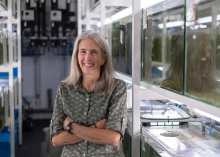Replaying the tape of life: how predictable is evolution?

Catherine peichel
Insitute of Ecology and Evolution, University of Bern (Switzerland)
Link to seminar: https://umontpellier-fr.zoom.us/webinar/register/WN_piYQ6vxXSymx_yXSSd1yFQ
Summary
How predictable is evolution? If we placed similar starting populations into replicated similar environments and then watched evolution happen, would each replicate population evolve in a predictable, deterministic way? Or, is evolution fundamentally unpredictable, dominated by chance events during and after colonization? Repeated evolution, often called ‘parallel evolution’, is taken as strong evidence for the role of natural selection in driving deterministic evolutionary change. I will first discuss our research identifying the factors that contribute to repeated evolution at both the phenotypic and genetic level in threespine sticklebacks, a classic system for the study of parallel evolution. One limitation of our previous studies is that we take a retrospective approach and therefore lack crucial historical data on the founding ancestral populations and ecosystem changes over time, which are contingencies that can shape subsequent evolutionary trajectories. An alternative approach is to conduct forward-in-time experimental evolution studies in which the properties of the founding populations are known. Then, we could ask whether replicate populations follow deterministic eco-evolutionary trajectories, or whether contingencies during and after colonization predominate these trajectories. I will describe just such an experiment in which we are following eco-evolutionary trajectories in real time. We stocked 8 natural lakes in Alaska with ~10,000 stickleback fish and will quantify the extent to which these replicate populations evolve in parallel, with respect to genotypes, phenotypes, and ecosystem properties, providing the first forward-in-time, highly replicated and whole-ecosystem study of parallel evolution in nature.
Watch previous seminars on our YouTube channel: https://www.youtube.com/channel/UCrX4IsZ8WIFcDa0ZmC7rcQg
Luis Miguel Chevin (UMR CEFE) luis-miguel.chevin@cefe.cnrs.fr
Contact du Comité SEEM: seem@services.cnrs.fr Contact du Labex CEMEB: cemeb-gestion@umontpellier.fr


